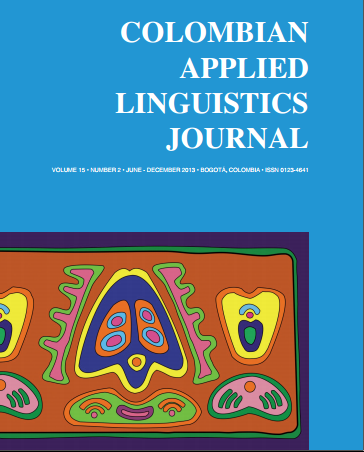DOI:
https://doi.org/10.14483/udistrital.jour.calj.2013.2.a06Published:
2013-07-01Issue:
Vol 15, No 2 (2013) July-DecemberSection:
Research ArticlesLiterature in efL: beyond language learning
Literatura en inglés como idioma extranjero: más allá del aprendizaje del lenguaje
Keywords:
literatura en EFL, experiencias de vida, entorno sociocultural, literatura y pensamiento crítico en EFL (es).Keywords:
Literature in EFL, life experiences, sociocultural environment, literature and critical thinking in EFL (en).Abstract (en)
This article presents the results of a qualitative research which looks into the field of literature in EFL. Seventh grade students of a private school in Bogota took part in the research. Data was collected by means of audio recordings of small group discussions, teacher´s journal, and responses to literature logs. The results show that the connections that EFL learners make with literary texts enrich their interpretations, analysis and value judgments of experiences and real life events. Furthermore, critical thinking skills are potentiated. In addition to this, literary texts bring up appealing and meaningful topics in the classroom enhancing students´ motivation and willingness to use the target language.
Abstract (es)
Este artículo de investigación presenta los resultados de una investigación cualitativa la cual examinó el valor de la literatura en EFL. La investigación se realizó con estudiantes de séptimo grado en un colegio privado en la ciudad de Bogotá. La recolección de información se realizó por medio de la grabación de discusiones grupales, diario del profesor y producciones escritas de los estudiantes. El análisis de la información evidenció que los estudiantes relacionan los textos literarios con sus experiencias de vida, eventos de la vida real, y elementos propios de su entorno sociocultural. Estas relaciones y conexiones enriquecen las interpretaciones y análisis de las experiencias de vida de los estudiantes así como también de los acontecimientos de la vida real. Los resultados también evidenciaron que la motivación e interés de los estudiantes para comunicar sus ideas en la lengua extranjera se incrementan gracias a que los temas que la literatura provee son relevantes y significativos.
References
Booth, W. (1961).The rhetoric of fiction. Chicago: Chicago university press.
Cohen, L. & Manion, L. (1995). Research methods is
education. London and New York: Routledge Taylor
and Francis group.
Dewey, J. (1900). The school and society. Chicago:
University press.
Freeman, L. & Long, D (1991). An introduction to second
language acquisition research. New York: Longman.
Gibson, J. (1950). The Perception of the Visual World.
Ogdensburg, NY, U.S.A: Houghton Mifflin
Hopkins, D. (1995). A teachers guide to classroom research. Buckingham, Philadelphia: Open University
Press
Hubbard, R. & Miller, B. (1993). The art of classroom
inquiry: A handbook for teacher researchers. New
Hampshire: Heinemann.
Lazar, G. (1993).Literature and Language Teaching:
A guide for teachers and trainers.Cambridge:
Cambridge University Press.
Lazar, G. (2008). Literature and Language Teaching: A
guide for teachers and trainers (16th Ed.).Cambridge: Cambridge University Press.
Miller, M. & Hubbard, R. (1991). The Heinemann reader
literacy in process: N.H. Heinemann: Portsmouth.
Niño, A. (2004). The role of critical thinking in the development of thematic units in an EFL context. (Thesis). Bogotá: Universidad Distrital Francisco José
de Caldas.
Rincón L., (2013) Colomb. Appl. Linguist. J.
ISSN 0123-4641 • Bogotá, Colombia. Pages 234 - 246
Richards, I. (1929). Practical criticism-A study of literary
judgment. A harvest book. San Diego New York-
London.
Rojas, R. (2005). Guiding students through a pedagogy
that promotes critical literacy (Thesis). Bogotá:
Universidad Distrital Francisco Jose de Caldas.
Rosenblatt, L. (1978). The Reader, the Text, the Poem:
The transactional Theory of the Literary Work. Carbondale: Southern Illinois University Press.
Rosenblatt, L. (1991). Literary Theory. In J. Flood et al.
(eds.) Handbook of Research on Teaching the
English Language Arts (pp. 57–62). Mahwah, NJ:
Lawrence Erlbaum Associates.
Rosenblatt, L. (1995). Literature as exploration New York:
the modern language association.
Sánchez, J. & Rincón, E. F. (2004). Enseñar literatura /
certezas e incertidumbres para un cambio: México:
Editorial Laia, S.A.
Tompkins, J. (Ed.). (1980). Reader-response criticism.
Baltimore: John Hopkins University Press.
Womack, K. & Davis, F. (2002). Formalist criticism and
reader-response theory.New York: Basingstoke,
Hampshire.
How to Cite
APA
ACM
ACS
ABNT
Chicago
Harvard
IEEE
MLA
Turabian
Vancouver
Download Citation
Metrics
License
This work is licensed under a Creative Commons Attribution-NonCommercial-NoDerivatives 4.0 International License.
Attribution — You must give appropriate credit, provide a link to the license, and indicate if changes were made. You may do so in any reasonable manner, but not in any way that suggests the licensor endorses you or your use.
NonCommercial — You may not use the material for commercial purposes.
NoDerivatives — If you remix, transform, or build upon the material, you may not distribute the modified material.
The journal allow the author(s) to hold the copyright without restrictions. Also, The Colombian Apllied Linguistics Journal will allow the author(s) to retain publishing rights without restrictions.









